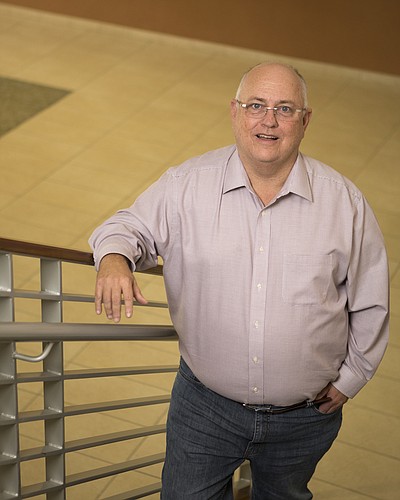- April 8, 2025
-
-
Loading

Loading

Eric Knellinger lost his wife to cancer, and now he’s battling it himself.
Despite those personal challenges, more than a decade into leading US Federal Contractor Registration, the fast-growing St. Petersburg company he founded in 2009, he has no plans to slow down and sees only more solid growth ahead. Revenues have increased nearly 20% since 2017, to $12.3 million last year.
Knellinger, 54, comes from an advertising background: Prior to founding USFCR, he sold print and digital ads for the likes of AT&T and Verizon. His life derailed completely, though, in 2007 when his wife, Linda, was diagnosed with Stage IV brain cancer.
‘There are many small businesses who want to work with the federal government, but there’s nothing out there that truly walks them through the process.’ Eric Knellinger, founder and president of US Federal Contractor Registration
To care for Linda and pay for her treatment at Moffitt Cancer Center in Tampa, “I sold everything,” he says. “Retirement accounts, boats, cars. … I had one truck left, and the house was in foreclosure.” He quit his job because the travel required to call on clients and make sales interfered with his ability to care for his wife and their two children, living at home at the time.
Around that time, Knellinger was approached by a friend, Stan Lusczynski, who managed the Raccoon Creek Recreation Area marina at MacDill Air Force Base in Tampa. Lusczynski, Knellinger says, urged him to start a company focused on getting local businesses registered to handle federal government contracts — monetizing what is, essentially, a free service that many small businesses have neither the time nor expertise to handle themselves. (Of course, being the federal government, free doesn't always mean simple.)
“He said, ‘I’m having to buy things for the marina from all over the country, and I’m paying a lot more money for shipping,’” Knellinger recalls. “He told me there are many small businesses who want to work with the federal government, but there’s nothing out there that truly walks them through the process.”
Knellinger initially viewed Lusczynski’s idea as a giant risk. But with just $5,200 to his name — proceeds from selling two gold coins — he took the leap.
USFCR’s biggest hurdle, at first, Knellinger says, was hiring qualified staff. He was creating a new industry on the fly, “blazing a trail,” he says, with dozens of Hail Mary cold calls every day to businesses. The byzantine, ever-changing requirements for federal contractor approval necessitated the creation of a learning center for clients as well as employees.
And Knellinger needed knowledgeable staff — desperately. He had to leave the company’s tiny office, which had been furnished with borrowed phones and computers, at 3 p.m. most days to ferry Linda to medical appointments.
Knellinger’s wife died in early 2011, a few months after attending USFCR’s first holiday party. The company did $3 million in revenue in 2010, its first year in business, and has grown steadily ever since.
Now fighting kidney cancer, which has mostly receded after spreading to his lungs, Knellinger clearly recalls Linda’s words that motivated him to start USFCR: “Eric, you can’t save me, but you can save our family.”
He’s done just that — and then some. USFCR’s workforce has swelled to 52 employees, necessitating a move to a 10,000-square-foot office at 9400 4th St. N., St. Pete.
The company has registered 100,000 businesses as federal contractors, Knellinger says; collectively, those companies have earned $10 billion from deals with Uncle Sam. The firm charges a flat fee of $599 per registration and doesn’t take a cut of contracts. It also makes money from an easily searchable database of federal contracts out for bids. Clients can access that software for an annual fee that ranges from $1,950 to $2,950.
“It’s almost like being an accountant,” Knellinger says of USFCR’s business model. “Do you do your own accounting, as a business? No, you roll it over to a professional, because the tax codes change every year.”
USFCR’s marketing strategy consists of a mix of online, phone and in-person efforts. Knellinger says he couldn’t afford traditional advertising when he first launched the firm, so he used a $100 Google AdWords gift card that got nearly instantaneous results.
“All of a sudden, people were looking for answers,” he says. The company still relies on internet search ads but also, pre COVID-19, sent sales reps to trade shows nationwide
And with the COVID-19 pandemic wreaking havoc on the economy, Knellinger sees even better times ahead for USFCR. “When the private sector goes down, the public sector goes up,” he says. “It’s a great time for businesses to get involved with the federal government. Wouldn’t you want the largest consumer of products and services in the world to be your customer?”